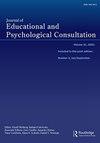将校本咨询理解为使用多种方法的工程
IF 1.1
4区 心理学
Q4 PSYCHOLOGY, EDUCATIONAL
Journal of Educational and Psychological Consultation
Pub Date : 2021-08-02
DOI:10.1080/10474412.2021.1954528
引用次数: 1
摘要
摘要:校本咨询的核心目的是让教师、家长、系统和社区能够获得心理和教育知识,从而成为标准实践。目前基于有限科学范式的研究方法没有充分解决这一目的。基于工程的应用研究是在多元化社会中研究心理教育科学、间接服务和课堂实践界面上的复杂问题的更好模式。这种研究需要多种方法的结合,重点是产生关于校本咨询实践和过程的有用知识。混合方法研究可能特别适合这项任务,因为它a)承认参与者的综合专业知识;b) 以务实的方法将教育科学与应用和实施现实相结合;以及c)承认教育系统本质上是相关的。我们提供了额外的考虑因素,这些考虑因素可能对研究人员解决应用校本咨询研究的棘手问题有用。本文章由计算机程序翻译,如有差异,请以英文原文为准。
Understanding School-Based Consultation as Engineering Using a Mix of Methods
ABSTRACT The central purpose of school-based consultation is making psychological and educational knowledge accessible to teachers, parents, systems, and communities so that it becomes standard practice. Current research methods based on limited scientific paradigms have not adequately addressed that purpose. Applied research based on engineering is a better model to study the complex problems at the interface of psychoeducational science, indirect service, and classroom practice in a diverse, pluralistic society. Such research requires a mix of methods focused on producing usable knowledge about the practices and processes of school-based consultation. Mixed method research may be particularly well suited to that task because it a) recognizes the composite expertise of the participants; b) features pragmatic approaches to merge education science with application and implementation realities; and c) acknowledges that educational systems are inherently relational. We provide additional considerations that may be useful as researchers tackle the thorny problems of applied school-based consultation research.
求助全文
通过发布文献求助,成功后即可免费获取论文全文。
去求助
来源期刊

Journal of Educational and Psychological Consultation
PSYCHOLOGY, EDUCATIONAL-
CiteScore
3.40
自引率
23.50%
发文量
20
期刊介绍:
The Journal of Educational & Psychological Consultation (JEPC) provides a forum for improving the scientific understanding of consultation and for describing practical strategies to increase the effectiveness and efficiency of consultation services. Consultation is broadly defined as a process that facilitates problem solving for individuals, groups, and organizations. JEPC publishes articles and special thematic issues that describe formal research, evaluate practice, examine the program implementation process, review relevant literature, investigate systems change, discuss salient issues, and carefully document the translation of theory into practice.
 求助内容:
求助内容: 应助结果提醒方式:
应助结果提醒方式:


